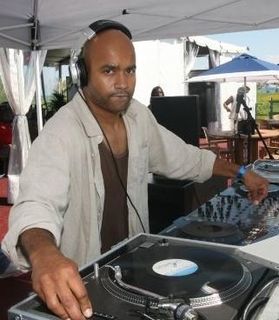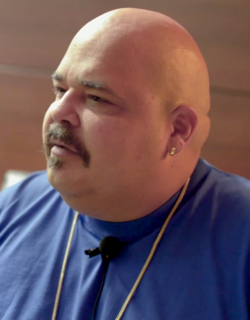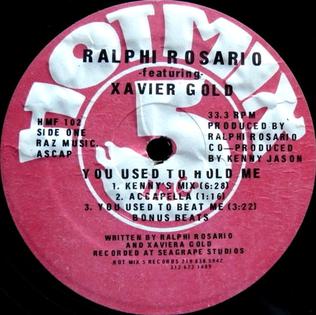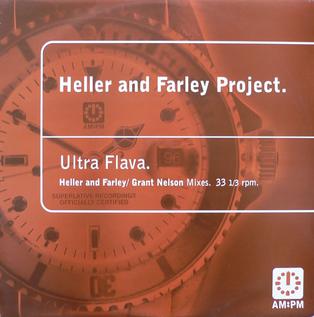Related Research Articles

A disc jockey, more commonly abbreviated as DJ, is a person who plays recorded music for an audience. Types of DJs include radio DJs, club DJs, mobile DJs, and turntablists. Originally, the "disc" in "disc jockey" referred to shellac and later vinyl records, but nowadays DJ is used as an all-encompassing term to also describe persons who mix music from other recording media such as cassettes, CDs or digital audio files on a CDJ, controller, or even a laptop. DJs may adopt the title "DJ" in front of their real names, adopted pseudonyms, or stage names.
House is a genre of electronic dance music characterized by a repetitive four-on-the-floor beat and a typical tempo of 120 to 130 beats per minute. It was created by DJs and music producers from Chicago's underground club culture in the 1980s, as DJs from the subculture began altering disco songs to give them a more mechanical beat and deeper basslines.
Chicago house refers to house music produced during the mid to late 1980s within Chicago. The term is generally used to refer to the first ever house music productions, which were by Chicago-based artists in the 1980s.

Richard Quitevis known by his stage name DJ Qbert or Qbert, is an American turntablist and composer. He was awarded America's Best DJ in 2010, was DMC USA Champion 1991 (solo) and achieved titles as DMC World Champion in 1992 and 1993.
Bad Boy Bill is a disc jockey (DJ) from Chicago, Illinois, U.S. who plays an assortment of house music.
Farley "Jackmaster" Funk is an American musician, DJ and record producer of Chicago house and acid house music. He is notable for writing and producing a number of highly influential tracks in the mid and late 1980s.

Steve W. "Silk" Hurley, also known as J. M. Silk, is an American club DJ, pioneering house music producer, songwriter, and four-time Grammy Award nominee; two times as Remixer of the Year, Non-Classical, and twice for Best Remixed Recording, Non-Classical.
Fast Eddie is an American house producer and hip hop musician from Chicago, Illinois.
WBMX is a commercial FM radio station in Chicago, Illinois, serving the Chicago metropolitan area and Northwest Indiana. The station is owned by Audacy, Inc. and airs a classic hip hop radio format.

WWBX is a radio station with a hot adult contemporary format in Boston, Massachusetts. The format started at 98.5 FM on February 9, 1991, and moved to 104.1 FM, replacing WBCN on August 12, 2009, to allow for the launch of WBZ-FM at 98.5 the next day. Its studios are located in Brighton, and its transmitter is on the upper FM mast of the Prudential Tower.

A DJ mixer is a type of audio mixing console used by disc jockeys (DJs) to control and manipulate multiple audio signals. Some DJs use the mixer to make seamless transitions from one song to another when they are playing records at a dance club. Hip hop DJs and turntablists use the DJ mixer to play record players like a musical instrument and create new sounds. DJs in the disco, house music, electronic dance music and other dance-oriented genres use the mixer to make smooth transitions between different sound recordings as they are playing. The sources are typically record turntables, compact cassettes, CDJs, or DJ software on a laptop. DJ mixers allow the DJ to use headphones to preview the next song before playing it to the audience. Most low- to mid-priced DJ mixers can only accommodate two turntables or CD players, but some mixers can accommodate up to four turntables or CD players. DJs and turntablists in hip hop music and nu metal use DJ mixers to create beats, loops and "scratching" sound effects.

Ralphi Rosario is an American house musician an founding member of the influential Chicago DJ group Hot Mix 5.

Nathaniel Pierre Jones, better known by his stage name DJ Pierre, is an American DJ and performer of house music based in Chicago. He helped to develop the house music subgenre of acid house, as member of Phuture, whose 1987 EP Acid Tracks, is considered the first acid-house recording. Allmusic.com calls Jones a crucial DJ and the production wizard partly responsible for the development of Chicago acid-house. Jones' first single, "Generate Power," became standard fare for scores of producers during the next few years. Philippe Renaud, a journalist for La Presse in Montreal, states that the term acid house was coined in Chicago in 1987 to describe the sound of the Roland 303 bass machine, which made its first significant recording appearance on Phuture's Acid Trax in that year.

DJ Sneak is a Puerto Rican-born American DJ and record producer raised in Chicago, Illinois, United States. He is noted as being one of the second wave of Chicago house producers, as well as a member of the vanguard of late-1990s United States house producers.
Dave Rajput also known as Dr. Mix, is a disc jockey (DJ), music programmer, and Master of Ceremonies (MC). In 1985 he co-founded with Andrew Starr, Hot Mix Productions in Phoenix, Arizona. Hot Mix Productions operated the syndicated "Hot Mix Radio Network" which played on up to 175 radio stations around the world.
Mickey Oliver is an American musician, who was born on the South Side of Chicago. He was instrumental in popularizing house music. As a founding member of the mix show team on Chicago radio station 102.7 WBMX, collectively known as the Hot Mix 5 became the President of the group. The Hot Mix 5 became a leading force in the early Chicago house music scene and the first to air the new sound. The show garnered over 2 million listeners which is a record for a major market radio that stands today.

"You Used to Hold Me" is a song by American DJ/producer Ralphi Rosario, featuring singer Xaviera Gold. Released as a single in 1987, the song was a hit and remains Rosario's most popular song.

DJing is the act of playing existing recorded music for a live audience.
"Button Pusha" is Electronic/House single that was written, produced, and recorded by American DJ/remixer/musician Ralphi Rosario featuring vocals by singer Aneeta Beat, which was taken from Rosario's debut set 2 Sides to the Story.

"Ultra Flava" is a house song by British duo Heller and Farley Project. After the wide renown with their remix of Ultra Naté's "How Long" in 1994 and M People's "Open Your Heart" in 1995, they released it as a single in 1996. It is a slightly re-worked version of their mix of "How Long", without Naté's vocals. They entitled it "Ultra Flava" as a nod to the track's origins. It peaked at number 22 on the UK Singles Chart and number-one on the UK Dance Chart. In the US, it peaked at number 3 on the Billboard Hot Dance Music/Club Play chart. The track was a huge club hit and received remixes by many DJs, like Boris Dlugosch, DJ Sneak, Grant Nelson, Mousse T. and Rhythm Masters. A black-and-white music video was also produced to promote the single.